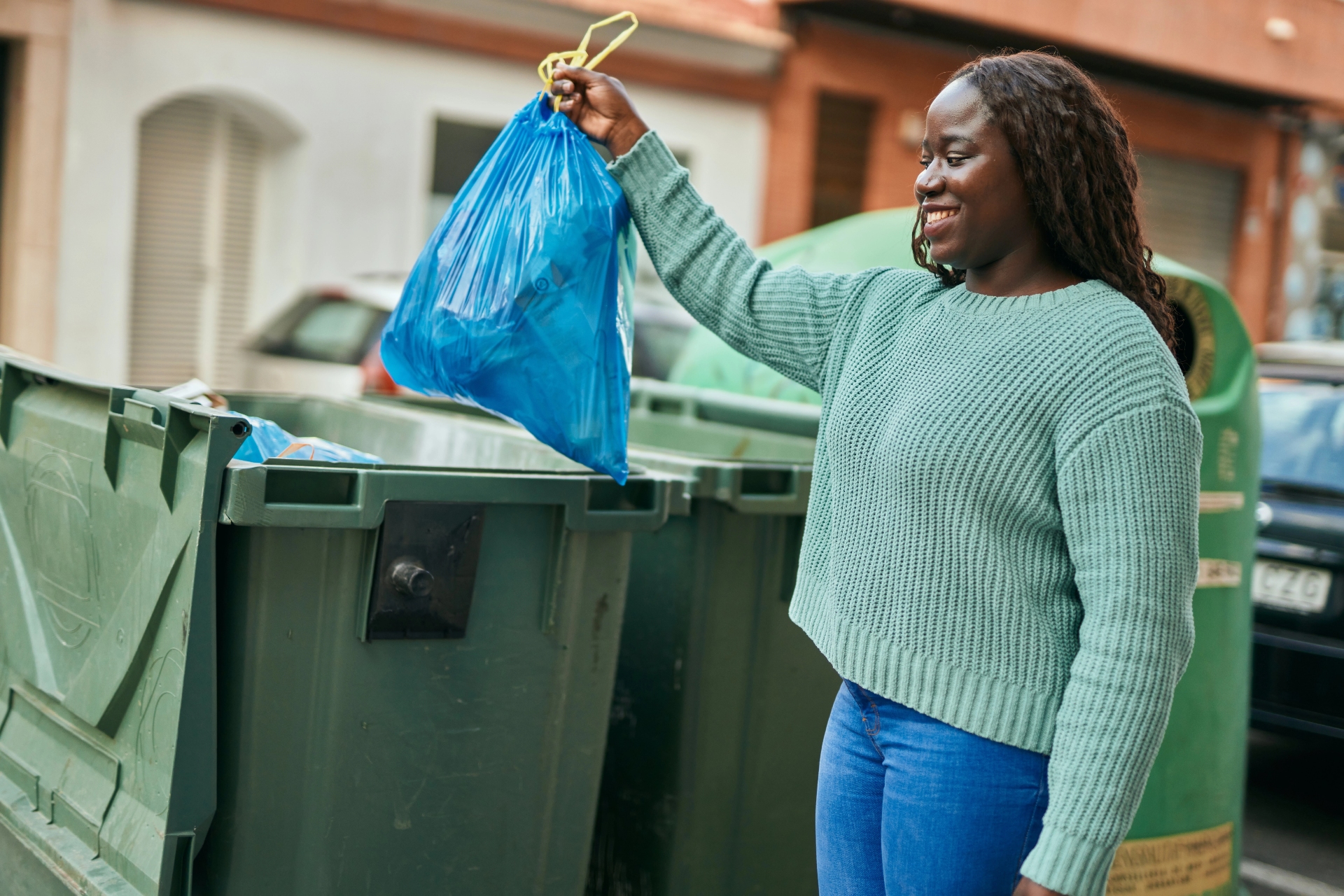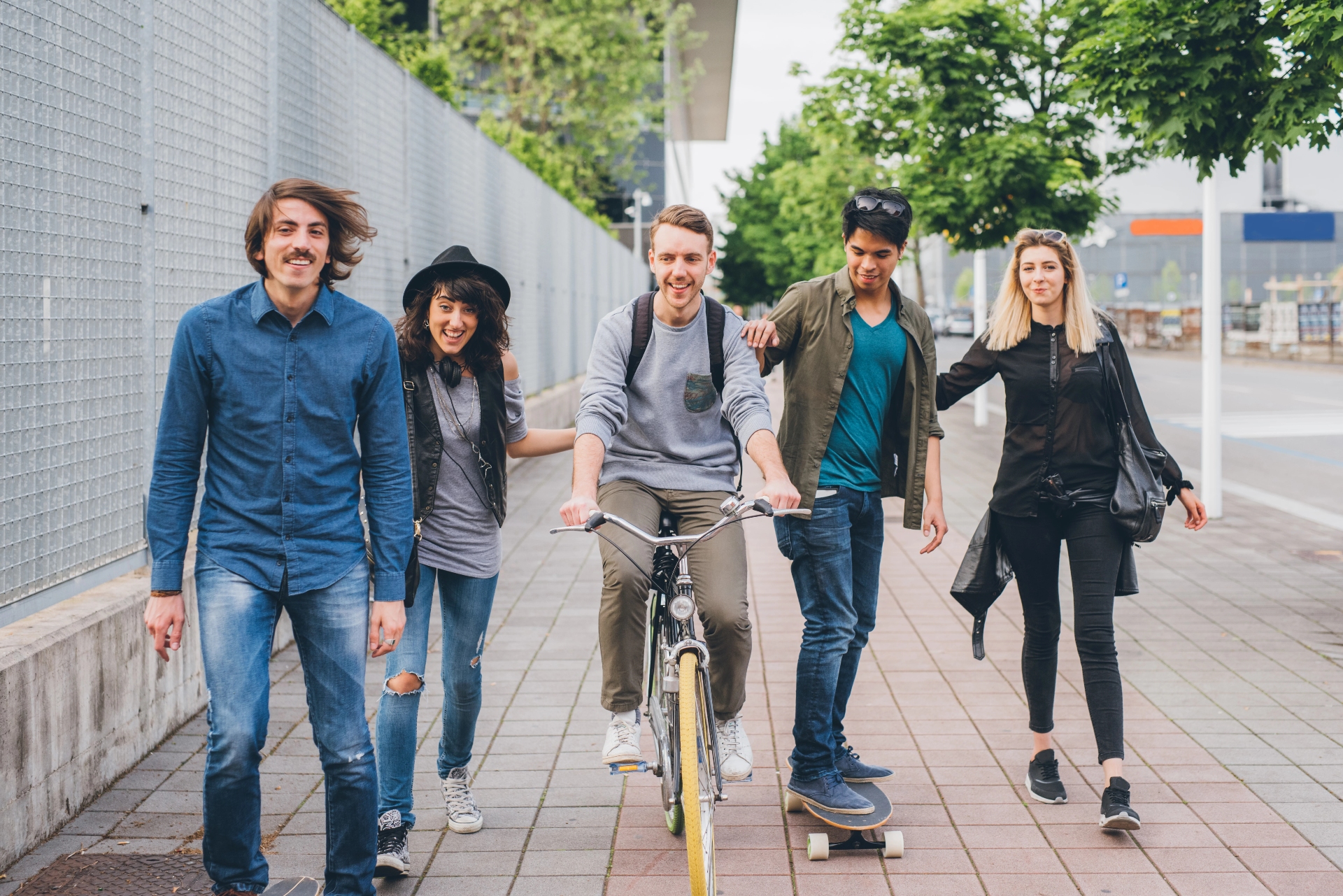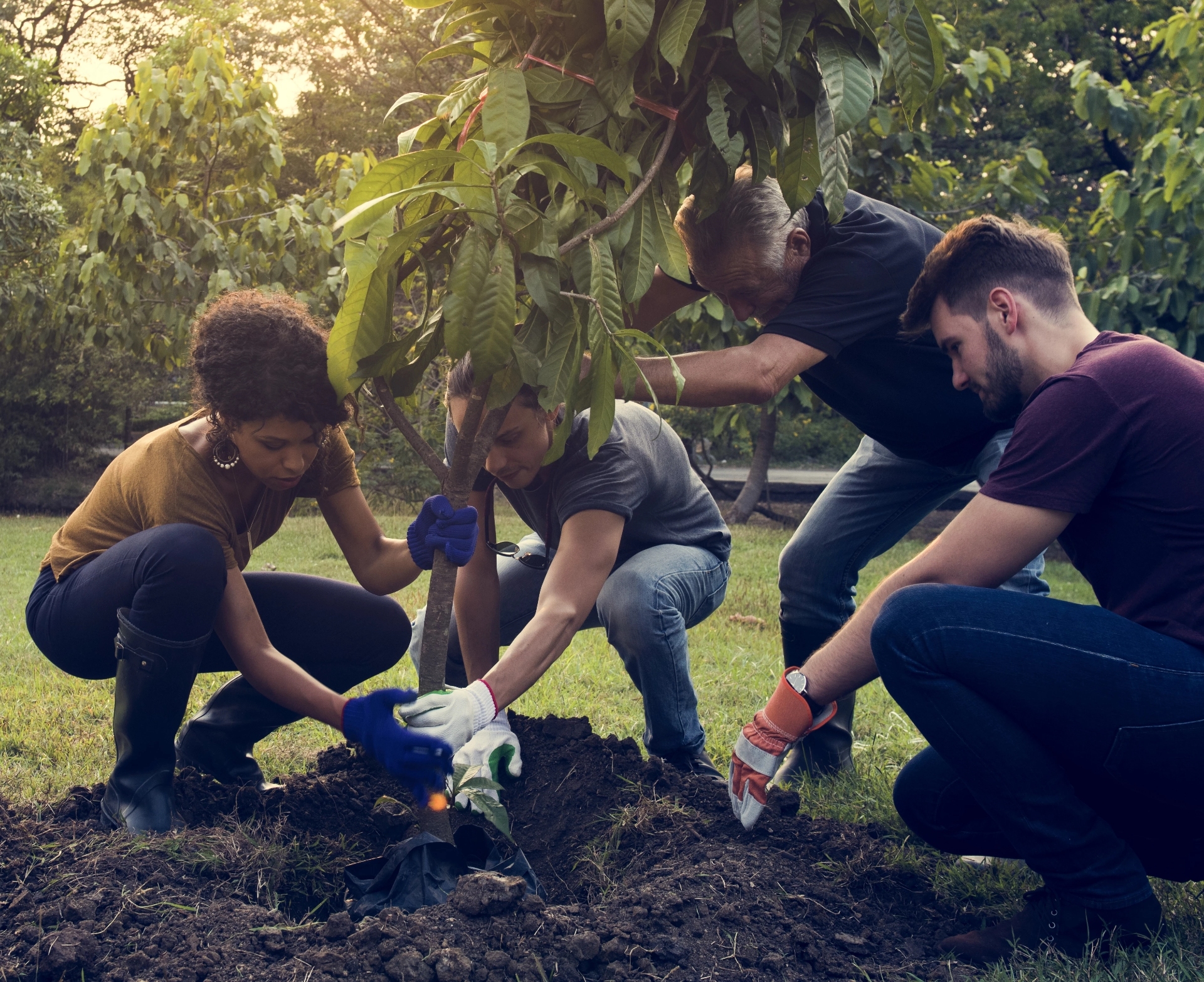WORLD EARTH DAY is a yearly event that honours the planet and highlights the problems we need to fix to protect it. The ‘we’ being governments, corporations, businesses and individuals, like you.
How you live determines your carbon footprint. This is the amount of CO2e you produce daily. CO2e means carbon dioxide equivalent, which includes CO2 and other greenhouse gases. The average carbon footprint for a person living in the UK is 12.7 TONNES, which is about the same as 18 cows.
To slow and start reversing climate change, we all need to cut our CO2e contributions by more than half, to around 5 tonnes. That might seem like a big ask, but it’s doable with some simple changes in how you go about your days as a student. Better still, these changes can save (or make) you money. And what student doesn’t love that?
1) RECYCLE FOR REWARDS
The recycle bins dotted around your Canvas and university campus are a big indicator that we all need to recycle more to cut down on waste.
It’s important to put all of your paper, cardboard, glass bottles, plastic packaging and cartons in the correct bins to stop them from ending up in landfill and polluting the planet. There are no rewards for this other than the feeling of pride for doing your bit.
There are, however, rewards for recycling other items you no longer need, like:
-
Getting paid to recycle your old phone at ENVIROFONE
-
Kickbacks for unwanted clothes through reGAIN or retailers like H&M
-
Vouchers for your old shoes at SCHUH
-
Earning money for an old laptop at MUSICMAGPIE
-
Getting 10p back of each OCADO bag you return to them
Before you throw anything away, check out Save The Student’s list of 12 THINGS TO RECYCLE FOR MONEY to see if you can make a profit.

2) GIVE OLD STUFF A SECOND LIFE
On the same theme as recycling, there’s an old saying about what’s useless to you being valuable to someone else: “One man’s trash is another man’s treasure.”
If you have good quality clothes, books, or electricals you no longer need, sell them on to someone that does.
You’ll make money and reduce waste, and buyers will save money and reduce their carbon footprint by purchasing used (a large percentage of carbon emissions comes from the production of new clothes and electricals). It’s a win-win.
eBAY, FACEBOOK MARKETPLACE and GUMTREE are all popular places to sell your old stuff.
If you’re not too bothered about making money and just want to get rid, there’s likely a charity shop within walking distance of your Canvas that will welcome your donation with open arms.
3) REUSE WHAT YOU CAN
One of the major issues events like World Earth Day are keen to highlight is the scourge of single-use plastics. Not only is the production of items like disposable cups, straws and bags responsible for millions of tonnes of greenhouse gas emissions, it’s the largest contributor to plastic waste.
More shockingly, it contributes to the death of humans and animals... In short, this stuff has to be stopped.
Thankfully, a BAN ON SINGLE-USE, non-recyclable plastics comes into force in the UK from October 2023. But you can ditch this plastic now by switching to reusable items such as:
-
Metal straws
-
Reusable water bottle
-
Reusable coffee mug
-
Reusable shopping bag
-
A menstrual cup to replace sanitary towels
-
Safety razors to replace disposable razors
4) SHOP LOCAL
Shopping locally is a great way to lower your carbon footprint because it means you’re not travelling as far to get what you need (i.e., not using a car and pumping CO2 into the atmosphere). We base our Canvas student accommodations close to shops and amenities for this reason.
When visiting your local shops, think about what you’re buying. Just because you’ve done your bit by walking into town, it doesn't necessarily mean supermarkets have stocked their shelves with goods that were made up the road.
Check labels to see where items are from. Products that have been produced locally or in the UK will naturally have a lower carbon footprint than items that have been shipped halfway around the world.
While we’re talking shopping locally, taking a walk to the shops does more than lower your carbon footprint, it supports local businesses and keeps money in the community.
If every student in the UK spent £5 PER WEEK in their local shops and businesses instead of multinationals, it would be worth £13 million a year to local economies.
5) WALK OR CYCLE WHERE YOU CAN
If you’re able to walk to the local shops, why not walk everywhere you can? Or if you can’t walk, cycle. These are the most eco-friendly ways of getting around and the best ways to cut down on greenhouse gases produced by the UK’S TRANSPORT SECTOR. They’re also the best modes of transport for your health.
London, Glasgow, Bristol and Manchester are ranked among the UK’S MOST WALKING CITIES. If your CANVAS is in any of these places, you should find getting from A to B on foot straightforward.
That said, not every destination is accessible by foot or bike. Sometimes, you need to travel further afield or get somewhere in a hurry. When this is the case, opt for public transport over cars. Canvas cities all have excellent transport links, so you should be able to get to your destination by bus, train, tram or—if you want the most scenic route—boat.
If you must travel by car, consider a car share. Apps like LIFTSHARE help you lower your carbon footprint, cut travel costs and meet new people all at once.

6) GO EASY ON THE MEAT
Food production is responsible for OVER A THIRD of all greenhouse gas emissions. That’s about 16.6 billion tonnes a year. The biggest culprit for these emissions is meat and dairy. Land-use and farming processes used in animal-based foods have a much higher carbon footprint than plant-based foods. If everyone reduces their intake of either of these foods, it will make a big impact.
One easy way to do this is to reduce your portion sizes (a quarter pounder rather than a half pounder, for example). Another is to swap meat for a plant-based product. If everyone opted for a veggie or vegan burger over a hamburger once a week, the REDUCTION IN GREENHOUSE GAS EMISSIONS would be equivalent to taking 16 million cars off the road.
If you were to choose a vegan diet over a meat-based one full-time, it’s generally agreed that you’ll reduce your carbon footprint by a quarter.
But let’s start with small steps. Take up a challenge like MEAT FREE MONDAY and see how you get on.

7) BE ENERGY SMART
AT CANVAS, utility bills are included in the cost of your accommodation. You don’t need to worry about cutting back on energy use to save a few quid.
But thinking about how you use water and electricity will help bring down your carbon footprint. The WATER SECTOR and electricity-producing POWER STATIONS combined make up over a fifth of the UK’s carbon emissions. The less energy you use, the fewer greenhouse gases they’ll pump into the air producing it.
The easiest way to cut energy consumption is to only use what you need:
-
Keep plug sockets switched off when they’re not in use
-
Turn off lights when you’re not in the room
-
Take shorter showers (showering for the length of your favourite four-minute song is a good way to time it)
-
Pop on a sweater rather than using the heating
-
Only wash clothes when they’re smelly or dirty
-
Only boil the water you need for tea, coffee or noodles
These simple changes will make a difference. To help further, we follow environmental best practices throughout our buildings to make them as energy efficient as possible.
8) FOR-GO FAST FASHION
On a student budget, being able to pick up a £5 dress or £10 pair of jeans makes a lot of sense. But cheap clothing is expensive for the environment. Fast fashion is responsible for 10% OF ALL GLOBAL EMMISSIONS. Because the clothes are cheap, the industry needs to produce more of them. And the more that’s produced, the more greenhouse gases are pumped into the air. For example, it takes around 3000 litres of water to make a single cotton t-shirt. That means emissions of around 30 kilograms of CO2e per t-shirt.
Not good, right? Well, the fashion industry sells around two billion t-shirts a year. And if we’re buying t-shirts, we’re going to need jackets and trousers and shoes to go with them and, well, you get the picture. Fast fashion isn’t environmentally friendly.
So what’s the alternative? Consider a few ethically made wardrobe staples that you can keep and repurpose for years — a black dress, a good pair of jeans, plain t-shirts, those kinds of things.
Also, do what we suggested earlier: buy used. Second-hand clothing reduces waste and tends to be more affordable than buying new. Plus, you’re more likely to come across some crazy items you won’t find on the high street. Cowboy boots and a knitted sweater anyone?

9) BROWSE RESPONSIBLY
Bad news: The device and browser you’re reading this post on contribute to your digital carbon footprint. That’s right. Even online you produces CO2e.
Music, videos, podcasts, news, messages, memes — everything you consume online is powered 24/7 by huge data centres that account for over 3.5% of the world’s greenhouse gas emissions. That’s similar to the amount produced by the airline industry. And because the internet continues to grow and get faster every day, its emissions are predicted to DOUBLE BY 2025.
Fortunately, there are ways to cut your digital carbon footprint that are as simple as turning the lights off when you leave a room. The most obvious one is to spend less time online: log off and get outdoors or read a book.
Where that’s not possible:
-
Put your computer to sleep to conserve energy when you’re taking a break - better yet, shut it down completely
-
Lower the brightness settings on your phone or monitor - DIMMING A SCREEN from 100% to 70% brightness can save up to 20% of the energy a screen uses
-
SEND FEWER UNNECESSARY EMAILS
-
Unsubscribe from newsletters you don’t read
-
Block video autoplay in your browser (FIREFOX does this by default)
-
Stream video on a smaller screen (i.e., a phone or tablet instead of a TV)
10) PLANT MORE TREES
Aren’t trees great? Out there absorbing carbon dioxide and looking good in the process. Yeah, trees are cool. Planting trees is cool. In fact, it’s more than cool. It’s essential.
According to PLANT FOR THE PLANET, the world needs ONE TRILLION more trees to tackle climate change.
There are different ways to go about planting trees. If you want to get hands-on, volunteer with a tree planting scheme. Your university conservation society or environmental group should be able to point you in the right direction. If not, a quick Google search for “tree planting schemes near me” will put you in touch with local organisations.
Alternatively, you can have a tree planted on your behalf via TREEAPP. Watch a few short ads each day and Treeapp’s partners will give a new tree life somewhere in the world. The app also lets you view your global impact and measure your carbon footprint. Use it four times a week to plant four trees and you’ll offset your average carbon emissions.
SMALL CHANGES MAKE A BIG DIFFERENCE
Making small changes to your student living will help lower your carbon footprint. Share these changes with a Canvas neighbour and you’ll help lower another carbon footprint. Keep on spreading the word and you’ll create a snowball effect that makes a real difference to the world.
And, hey, we’re always up for learning new ways to lower our carbon footprint too. If you have any simple tips of your own, we’d love to hear them @canvas_studentuk.
MORE FROM LIFE AT CANVAS
UK adventure time: Cities to visit within an hour of your Canvas
One of the great things about the UK is it's size. It packs a LOT into a small space. You don’t have to travel far to experience new cities and all they have to offer. If you’ve got a free day or two coming up, here are our favourite places to visit within an hour of your Canvas city.
Read moreLiving your best student life on a budget
It's important to know how to manage your money as a student, otherwise it might not last you through term time (and don't forget the holidays in between). But you also don't want to spend your whole time cooped up in your student accommodation to avoid spending anything. We've pulled together the ultimate guide to living your best student life on a budget, including handy budgeting tips and recommendations for cheap days and nights out.
Read more




